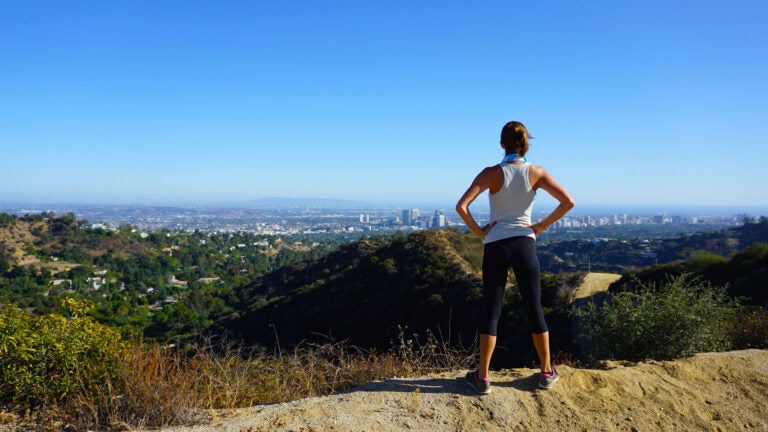
Are noise, pollution, and too much screen time making you cranky? USC experts remind us how to stay ahead. (Photo/iStock)
Sane in the city: 5 tips to manage the pressures of life in the urban jungle
Big cities like Los Angeles can overstimulate the senses. USC experts suggest some ways to protect your mental health
City life can be vibrant, diverse and dynamic. But it can also be crowded, polluted and noisy. With as much as two-thirds of the world’s population expected to live in cities by 2050, some experts are concerned about the effects of city life on mental health.
“It is overstimulating,” said Camille Dieterle, assistant professor of clinical occupational therapy in the USC Mrs. T.H. Chan Division of Occupational Science and Occupational Therapy. “Overstimulation can make people feel tired, stressed, overwhelmed, cranky and irritable.”
Studies show implications for urban mental health. Some research has illuminated links between city life and mental health issues like depression and anxiety. On the flip side, longterm studies indicate that people living in the nation’s greenest areas live longer. And those who go out into nature struggle less with mental health, including experiencing less depression and stress.
Fortunately, people immersed in urban life can find ways to stay mentally and physically fit, say USC experts. Here are five tips for boosting urban mental health:
Give your senses a break
Reduce sensory overload from fire engine sirens, leaf-blowers, traffic and other noises of city life, Dieterle said, and build in breaks to ease the rush. For example, does the TV really need to be blaring 24/7? Do you have to schedule appointments back-to-back, or could you give yourself a 15-minute break between them?
Meditating or breathing deeply for a couple of minutes makes a difference, too, she said. (Visit the MindfulUSC website to download meditation tools. USC students and employees are eligible for mindfulness classes as well.)
Use urban green spaces to recharge
Scientists see links between nature and mental health. A park, a tree outside your window, even a potted plant — they nourish the soul. “Getting out and experiencing whatever green is available … There is a whole body of research about the benefits of doing that,” said Travis Longcore, USC assistant professor of architecture, spatial sciences and biological sciences. “You are captivated by nature in a way that is effortless and allows your mind to relax and recover.” The result is that you return to your daily activities refreshed, calm and creative.
Sleep to boost mental health and rebuild the body
Sleep more, and do it in the dark. Not only is light distracting, but it also can interfere with the body’s circadian rhythms. Blue light, in particular, convinces the body that it’s daytime. Longcore collaborates with the makers of F.lux, an app that limits the blue light coming out of a device’s screen at night. (Apple has a version called Night Shift.)
And it’s not just about how well-rested you feel tomorrow; research shows that light exposure during the night can boost cancer risk. Good blackout window shades or an eye mask should block out the nighttime light so common in city life. Earplugs encourage sleep too.
Exercise, even if it’s a walk around a city block
Exercise is good for both body and mind. “We’re made to move,” explained Ian Culbertson, a lecturer in the Department of Physical Education of the USC Dornsife College of Letters, Arts and Sciences. A run around the track or an hour of yoga is great, but you can also fit exercise into your day in smaller doses. Both Dieterle and Culbertson like to take phone meetings while they’re walking.
Breathe fresh air
The parts of urban living associated with pollution from automobiles and shipping are also the ones associated with high cancer risk, cautioned Longcore. If you can’t afford to live and work in a place with decent air, he suggested, keep your windows closed and invest in a good air filtration system, if it’s within your means. And though exercise is good, don’t do it next to a congested freeway. You can also adjust your workout time and place to exercise when air is cleaner, suggests avid runner Ed Avol, a Keck School of Medicine of USC air quality researcher.
And when all else fails? Building in brief escapes from urban living to head to the mountains or coast could be a prescription for long-term stress relief.



